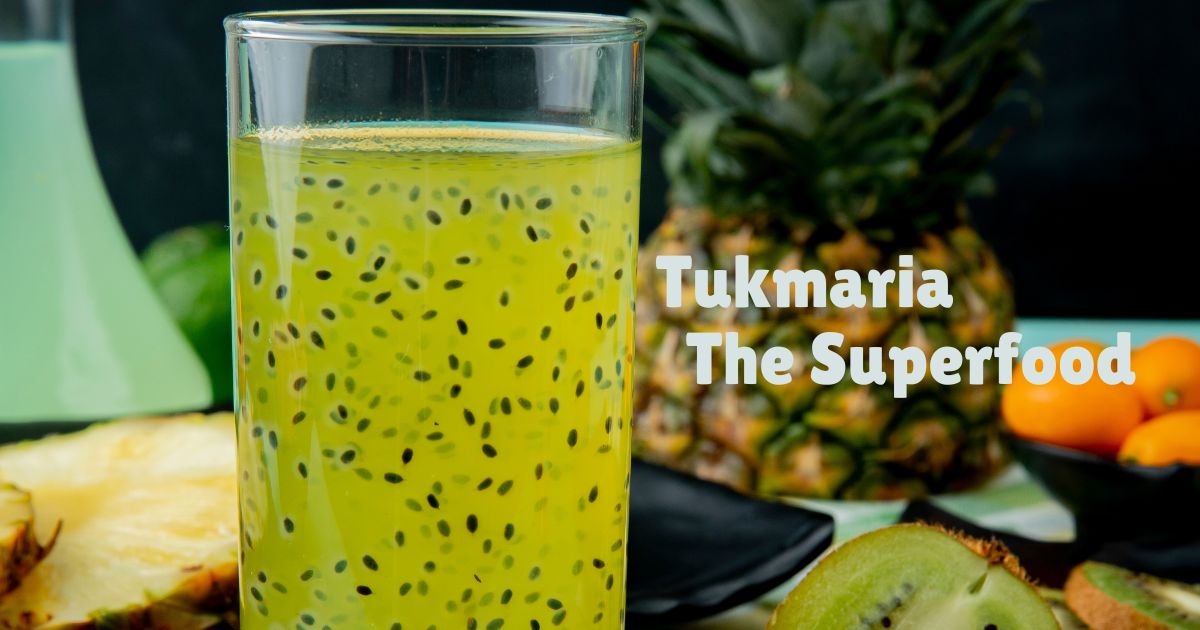Tukmaria seeds, also known as basil seeds or Sabja seeds, are gaining attention in the world of superfoods. These tiny black seeds, similar in appearance to chia seeds, have been used in traditional medicine for centuries, particularly in Indian and Middle Eastern cultures. Today, they’re being recognized globally for their amazing health benefits and versatility in the kitchen. But what exactly are tukmaria seeds, and why should you consider adding them to your diet? Let’s dive into everything you need to know about this powerful ingredient.
What Are Tukmaria Seeds?
Tukmaria seeds are derived from the sweet basil plant, Ocimum basilicum. Despite being commonly known as basil seeds, they’re different from the ones used for growing basil plants. When soaked in water, they swell up and develop a gelatinous outer layer, which makes them perfect for adding to drinks and desserts. Tukmaria seeds have been part of Ayurvedic and Chinese medicine for their cooling properties and numerous health benefits.
Nutritional Profile of Tukmaria Seeds
Tukmaria seeds are packed with nutrients despite their small size. They contain high levels of fiber, omega-3 fatty acids, protein, and various vitamins and minerals. Specifically, they’re rich in iron, calcium, magnesium, and potassium. What’s particularly interesting about these seeds is their high fiber content, which plays a significant role in digestion and weight management.
Health Benefits of Tukmaria Seeds
Improves Digestion
One of the most celebrated benefits of tukmaria seeds is their ability to improve digestion. The high fiber content in these seeds helps regulate bowel movements and prevents constipation. Their gelatinous nature also soothes the digestive tract, making them excellent for those with digestive issues like bloating and indigestion.
Aids in Weight Loss
Tukmaria seeds are great for weight management. When soaked, they expand and form a gel-like substance that keeps you feeling full for longer. This helps in reducing hunger pangs and controlling your calorie intake, making it easier to stick to a weight loss plan.
Regulates Blood Sugar Levels
Tukmaria seeds can help manage blood sugar levels, making them beneficial for people with type 2 diabetes. The fiber in the seeds slows down the metabolism of carbohydrates, which in turn helps control blood sugar spikes after meals.
Promotes Healthy Skin
Tukmaria seeds are packed with antioxidants, which help in reducing oxidative stress on the skin. They also contain anti-inflammatory properties that can help soothe skin conditions like eczema and psoriasis. Regular consumption of tukmaria seeds may lead to healthier, glowing skin.
Boosts Heart Health
The omega-3 fatty acids present in tukmaria seeds are excellent for heart health. These fatty acids help reduce bad cholesterol (LDL) levels and improve good cholesterol (HDL) levels, thus lowering the risk of cardiovascular diseases.
Relieves Stress
In Ayurvedic medicine, tukmaria seeds have long been used for their calming and cooling properties. Consuming these seeds regularly can help relieve stress, anxiety, and even depression. The seeds are believed to have adaptogenic properties, which help the body cope with stress.
How to Use Tukmaria Seeds in Your Diet
Incorporating tukmaria seeds into your diet is incredibly easy. These seeds are tasteless, which makes them versatile in various dishes. Here are some popular ways to enjoy tukmaria seeds:
In Drinks
Add soaked tukmaria seeds to your lemonade, smoothies, or herbal teas for a refreshing twist.
In Desserts
Use them in puddings, custards, or ice creams for a unique texture and added nutrition.
As a Thickener
Use tukmaria seeds as a natural thickener in soups and sauces, thanks to their gel-like consistency when soaked.
In Baking
Mix them into bread or muffin batter for a fiber-rich, healthy snack.
Tukmaria Seeds vs. Chia Seeds: What’s the Difference?
Many people compare tukmaria seeds to chia seeds because they look similar and offer comparable health benefits. However, there are some differences between the two. Tukmaria seeds swell faster than chia seeds when soaked and have a slightly different nutritional profile. Chia seeds have more omega-3 fatty acids, while tukmaria seeds are higher in fiber. Both are excellent choices, but tukmaria seeds may be easier to digest for some individuals.
Are There Any Side Effects of Tukmaria Seeds?
While these seeds are generally safe for most people, there are a few things to keep in mind. Overconsumption can lead to digestive issues like bloating or an upset stomach due to their high fiber content. It’s important to start with a small amount and gradually increase the quantity. Also, pregnant women and individuals on blood-thinning medications should consult their healthcare provider before consuming these seeds regularly.
How to Store Tukmaria Seeds
These seeds should be stored in an airtight container in a cool, dry place. They have a long shelf life, but keeping them away from moisture is crucial to prevent them from going rancid. Proper storage ensures that they retain their nutritional benefits for an extended period.
Where to Buy Tukmaria Seeds
These seeds can be found in health food stores, online, and in Asian supermarkets. When purchasing, ensure you’re buying high-quality seeds that are free from additives or preservatives. Organic options are widely available and are usually a better choice if you’re looking to avoid pesticides or chemicals.
Tukmaria Seeds and Hydration
One unique property of these seeds is their ability to retain water. When soaked, they can absorb up to 10 times their weight in water, making them excellent for hydration. This feature is particularly beneficial in hot climates or for those looking to maintain electrolyte balance after physical activity.
Detoxification
Thanks to their high fiber content, these seeds help in detoxifying the body. They act as a natural cleanser, helping to flush out toxins from the digestive system. Consuming these seeds regularly can promote better gut health and improve overall well-being.
Conclusion
Tukmaria seeds are more than just a trendy superfood—they’re a nutritional powerhouse that offers a wide range of health benefits. From aiding digestion and promoting heart health to helping with weight loss and stress relief, these seeds can easily become a valuable addition to your diet. Whether you sprinkle them on your morning smoothie or use them as a thickener in your favorite recipes, these tiny seeds pack a big punch.
FAQs
Can tukmaria seeds be eaten raw?
It’s recommended to soak these seeds before consuming them. When soaked, they expand and form a gel-like substance that’s easier to digest.
How long should I soak these seeds?
You should soak them for at least 15-30 minutes to allow them to swell and develop their characteristic gel-like texture.
Can these seeds help with weight loss?
Yes, they can. Their high fiber content keeps you fuller for longer, reducing hunger and helping you manage your calorie intake.
Are tukmaria seeds good for skin health?
Absolutely. They are rich in antioxidants and have anti-inflammatory properties that can improve skin health and reduce signs of aging.
Is there a difference between chia seeds and tukmaria seeds?
Yes, while both offer health benefits, tukmaria seeds swell faster and have a slightly different nutritional profile compared to chia seeds.





